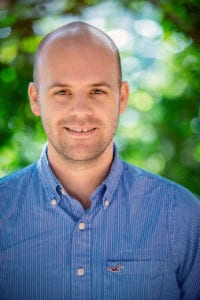
Trainee Author: Kevin Gillinder, PhD
Research Fellow
Australian Centre for Blood Diseases, Monash University, Australia
(Photo courtesy Gillinder)
This is the first study to show neomorphic functions in a zinc finger binding protein driven by DNA-binding promiscuity due to the loss of DNA-binding specificity. The authors characterize the function of Klf1, a zinc finger protein, and its mutant murine form, Nan-Klf1. They show that the Nan-KLF1 mutant protein exhibits a gain-of-function phenotype, binding to novel loci within the genome and leading to upregulation or downregulation of non-target genes.
This dominant mutation results in a more severe phenotype than a Klf1 loss of function mutation. This study opens up new avenues to study known disease-relevant mutations in human KLF1 to ultimately gain valuable therapeutic insight into treating the erythroid diseases caused by mutations in this transcription factor.
ASHG: Could you describe your research for us?
Dr. Gillinder: The focal point of my research is understanding the function of transcription factors in disease. I am particularly interested in how sequence-specific transcription factors really work at the molecular level–DNA motif recognition and cofactor recruitment–to regulate gene expression, and how this activity may be disrupted by mutation or manipulated therapeutically.
ASHG: What are your career goals?
Dr. Gillinder: I love my science. My career goal is to lead a successful academic research program, studying the role of transcription factors in human disease and harnessing this knowledge to develop new ways of treating blood cancers.
ASHG: Why did you choose genetics as your field of study?
Dr. Gillinder: From a very young age, I’ve always been fascinated by how nature works. I used to breed chickens to exhibit at the local country fair and I suppose it was then that my interest in genetics was first laid down.
As I finished my undergraduate degree, the Human Genome Project was wrapping up and I remember the excitement and the promise that one day we may be able to perform “personalized genetic medicine.” The timing was perfect and the opportunity to be part of this revolution seemed too good to miss!
ASHG: If you could pick three words that describe yourself, what would they be?
Dr. Gillinder: Alchemist, Brewer, Perfectionist.
The Trainee Paper Spotlight highlights outstanding papers written by trainee members of ASHG. Submit your science to be featured, and join the ASHG Trainee Forum to keep up with new ones.
